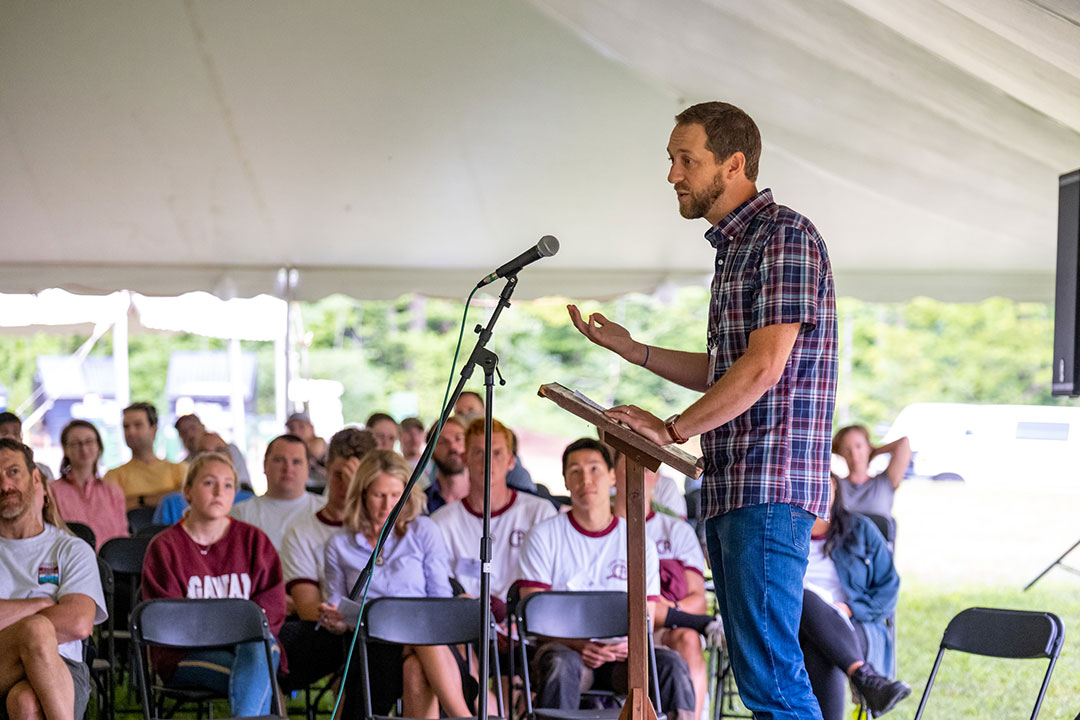
Vespers is a secular service held at camp every Sunday morning during the summer. Each week, one member of the Agawam community is invited to deliver reflections on a relevant theme. These talks typically reinforce Agawam’s core values, such as leadership, friendship, and honesty. The much-loved ritual of Vespers talks is extended during Agawam reunions, with alumni thinking back on their time at Agawam. At the 100th Agawam reunion, former camper/counselor “Commodore” Jeremy Cluchey (camper ’91-’96; Senior Club ’97; staff ’99, ’01, ’03, ‘05) offered his reflections on the Woodcraft Law of Beauty.
Good morning. I’d like to make a Nature Report.
Earlier this summer, I saw a Red-bellied Woodpecker. It was on our woodpecker feeder in our yard in Bowdoinham, Maine. If you’ve never seen a Red-bellied Woodpecker before, they’re about 10 inches long, and have black wings with white checks on them. As you might guess from their name — Red-BELLIED Woodpecker — their most prominent feature is their bright, red…head. Sorry, it’s confusing. Their belly is barely even pink. It’s a classic ornithologist move.
The most notable fact about the Red-bellied Woodpecker, though, is that when I first came to Camp Agawam 28 years ago, I could not have made this Nature Report. It’s not just because I was 10 and didn’t know any birds. It’s because there weren’t any Red-bellied Woodpeckers in Maine. Over the past three decades, Red-bellied Woodpeckers have shifted their range northward, adapting to the steadily increasing temperatures that are affecting species and ecosystems around the planet.
The reality behind this shift presents a massive stewardship challenge, to say the least. When I think about how we can face it, I find myself drawing on what I learned about stewardship at Camp Agawam. As Agawam alums, we have deep training in stewardship, although we didn’t always use that word. We also called it Beauty, with a capital B.
At Agawam, Beauty with a capital B is not about how you look — it’s about how you look out for the things around you that need caring for. We learned that we have a responsibility to care for the world around us, and that it begins by caring for ourselves.
We learned to “Be clean, both yourself and the place you live in.” This was baked into the Agawam experience — from Morning Dip, to making sure our fingernails were clean when “Chief” said, “counselors, inspect!” to competing to win cabin clean-up, to campus sweeps where we lined up shoulder-to-shoulder on Forbes Field or Middle Grove and picked up every scrap of litter down to the tiniest piece of plastic.
We also learned to be reflective, to be mindful of our actions and their effect on the world. We learned to “Understand and respect your body for it is the temple of the spirit.” We learned this at Vespers, on trips, through Katiaki, in Council.
Of course, we learned to “Be a friend to all harmless wildlife, conserve the woods and flowers.” I am so pleased that a key priority of the Agawam, My Agawam campaign is to preserve land around Crescent Lake and around camp — not to expand and develop it, but to protect it from encroaching development. By preserving it, we’ll also provide excellent, Mawaga-grade habitat for species like the Red-bellied Woodpecker that will increasingly need it.
Finally, we learned to “Always be ready to fight wildfire in forest or in town.” I have to be honest, I have really dropped the ball on this one. I am literally never ready to fight wildfire in any venue. I own a hose, that’s about it.
So now we’re wrapping up 48 hours at camp, a weekend in this idyllic place where we get to reconnect with these values and with each other. And we’re about to disperse, heading back to a world I suspect we all agree could use more Beauty with a capital B.
I started these remarks with a Nature Report, and I’d like to end with a Challenge. Here it is: By the end of the summer, I challenge each of us to identify one way we can be better stewards of our communities, and then do it. It could be organizing people to pick up litter, or planting native plants in your yard, or joining your town’s Conservation Committee.
Whatever it is, if we all do even just one thing, the collective impact could be really significant. I also think it would be just about the best legacy — and the best 100th birthday present — any camp could hope for.

